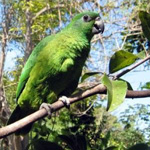Brazil Gets Serious About Biopiracy of Its Natural Diversity
By Saikat
About My Planet
With Operation New Direction, Brazil is shoring up its zeal to clamp down on companies which it believes are profiteering from its biodiversity without adequately compensating the community or the country.
Thanks to the Amazon, Brazil has an abundance of natural riches. The Amazon is also a gigantic laboratory for many pharmaceutical companies and research organizations that seek its natural wonders for arcane drug concoctions. Indigenous communities and forest defenders say that the indigenous communities are often disregarded as these companies go on to make billions from their local habitats.
Starting next year, Brazil will be ramping up efforts to levy fines on companies that do not pay fair compensation for the use of genetic material native to Brazil. Since July, Brazil has managed to levy 100 million reais ($59 million) in fines.
Bruno Barbosa, who heads inspection for the environmental oversight agency Ibama says –
“Given that fighting biopiracy is a new process and that Brazil has one of the biggest reserves of biodiversity in the world, I think most of this activity is illegal, and we’re going to find those people.”
Examples of biopiracy abound. The hypertension medication captopril is derived from snake venom that indigenous groups used on arrowhead tips and the anti-inflammatory drugs from the yellow-and-green Kambo frog are just two of the many. In both cases, the windfall benefits did not trickle down to the community.
Now, Brazil means business. Fines in 2011 may rise to $29 million each and companies face possible cancellation of patents in Brazil if inspectors find they did not register the use of local species.
But is there a negative aspect to all this?
Critics point out that the aggressive initiative by the government is a blanket move that may put off organizations from doing research on possible cures. It will slow crucial scientific breakthroughs that could provide new cancer cures or remedies for diseases suffered by local populations.
The current rules do not make any distinction between genuine parties and those engaged in breaking the laws using unfair means. Laws should also take into consideration the bottlenecks when it comes to compensating local communities for knowledge passed down generations.
But Bruno Barbosa votes for the legislation.
“This is going to enable concrete alternatives that substitute destruction of the ecosystem for new economic mechanisms.”
Source: About My Planet








Comments
Brazil Gets Serious About Biopiracy of Its Natural Diversity — No Comments